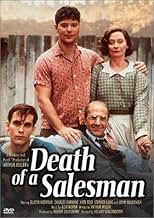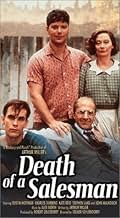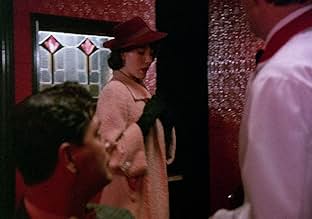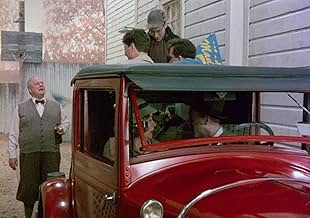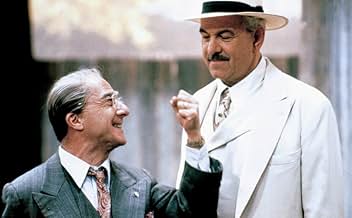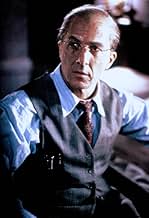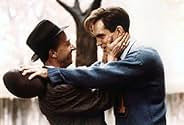IMDb रेटिंग
7.2/10
12 हज़ार
आपकी रेटिंग
अपनी भाषा में प्लॉट जोड़ेंAn aging traveling salesman recognizes the emptiness of his life and tries to fix it.An aging traveling salesman recognizes the emptiness of his life and tries to fix it.An aging traveling salesman recognizes the emptiness of his life and tries to fix it.
- 3 प्राइमटाइम एमी जीते
- 7 जीत और कुल 12 नामांकन
David Chandler
- Bernard
- (as David S. Chandler)
Kathryn Rossetter
- Woman from Boston
- (as Kathy Rossetter)
फ़ीचर्ड समीक्षाएं
I had to read Arthur Miller's Death of a Salesman` for my English class this year. Our teacher was a very industrious woman and let us analyze every character's every word several times, until we couldn't hear the words Willy`, Linda`, Biff`, American Dream` and stockings` any more. It was terrible! She didn't show us any theater or film version, so we began to utterly dislike the text as a whole: a sentimental play where you already know the ending when you read the title.
A few days ago, I spotted Volker Schlöndorff's film version on television, a German dubbed version, but that doesn't matter because I already knew the lines and Schlöndorff hardly changed them.
Fortunately, Schlöndorff didn't make any effort to put his own special style into the movie, he just left the play the way it was and the way, I suppose, Arthur Miller wanted it. So some of you might claim that this version was too stage-drama-like, not cinematic. For me, this was ideal because I could see the REAL, lively Death of a Salesman`, played by an ideal cast: Dustin Hoffman: a little over-acting, but enthusisiastic; Kate Reid: so authentic that she could be taken for my mother; John Malkovich: silent, thoughtful, self-confident`, great! How shall I put it? This film sort of opened my eyes towards this great, merciless work of Arthur Miller. This play is something you can orientate your life to. At many important turning points of your life, you can remember Willy Loman and his fate that is fictitious but and believe me, I know some people who are exactly like him definitely could be the fate of a real person, and not only of an American. I found the Salesman` important, not as much as a criticism of the American Dream but an account of what must happen, if lives are built upon lies lies to others and lies to yourself. Those people who think Death of a Salesman` is rubbish are those who suppress cruel truths just as Willy Loman does.
So, when I saw this movie, I was completely stunned because its hopelessness became clear to me and I noticed how crucial this American classic really is. I give Schlöndorff 8 out of 10 stars because there are some flaws in his way of directing (e. g. letting Malkovich and Lang play their young alter egos was stupid because no one believes that they are 17).
Another sad example how bad teachers can destroy a masterpiece. Shame on you, Mrs. H.!
A few days ago, I spotted Volker Schlöndorff's film version on television, a German dubbed version, but that doesn't matter because I already knew the lines and Schlöndorff hardly changed them.
Fortunately, Schlöndorff didn't make any effort to put his own special style into the movie, he just left the play the way it was and the way, I suppose, Arthur Miller wanted it. So some of you might claim that this version was too stage-drama-like, not cinematic. For me, this was ideal because I could see the REAL, lively Death of a Salesman`, played by an ideal cast: Dustin Hoffman: a little over-acting, but enthusisiastic; Kate Reid: so authentic that she could be taken for my mother; John Malkovich: silent, thoughtful, self-confident`, great! How shall I put it? This film sort of opened my eyes towards this great, merciless work of Arthur Miller. This play is something you can orientate your life to. At many important turning points of your life, you can remember Willy Loman and his fate that is fictitious but and believe me, I know some people who are exactly like him definitely could be the fate of a real person, and not only of an American. I found the Salesman` important, not as much as a criticism of the American Dream but an account of what must happen, if lives are built upon lies lies to others and lies to yourself. Those people who think Death of a Salesman` is rubbish are those who suppress cruel truths just as Willy Loman does.
So, when I saw this movie, I was completely stunned because its hopelessness became clear to me and I noticed how crucial this American classic really is. I give Schlöndorff 8 out of 10 stars because there are some flaws in his way of directing (e. g. letting Malkovich and Lang play their young alter egos was stupid because no one believes that they are 17).
Another sad example how bad teachers can destroy a masterpiece. Shame on you, Mrs. H.!
Arthur Miller's compelling work is deftly translated to the small screen here, with riveting performances by Dustin Hoffman as Willy Loman, Kate Reid as Willy's wife Linda, and John Malkovich as the prodigal son Biff. This work touches my soul on several levels: sympathy for the fallen man Willy, understanding of the difficulty of both hating your father and wanting him to be proud of you as Biff shows, and the ever-protective enabler Linda, who defends Willy even as she sees him failing before her eyes. Miller took a simple American family struggling to make life work, and made each character in their own way extraordinary.
Volker Schlondorff's adaptation of Arthur Miller's bed-rock of an American tragedy, Death of a Salesman, is one of the best made-for-TV movies of the 80's (odd how it never got a theatrical release though). It gives the star power of Dustin Hoffman in the iconic role of Willy Loman, and for a great theater actor-turned-screen star (though mostly low-key through his career), John Malkovich, and some fine character acting as well. If you've read the play, you might envision something else entirely, and if you've seen it on stage it might bring more disappointment. It is the sort of play you end up going through whether you want to or not in English class(es), particularly in college. It is an important film to see/play to read when you're around this age bracket, as the struggles of Willy and Biff collide alongside each other, and some kind of catharsis needs to come for both- one who's life has almost gone up in smoke, and one who needs to figure it out.
It's not worth talking about much of the actual plot or story of the film/play, although it is of note that one of the very best (or at least most effective) scenes for me comes when Willy visits Howard at the office. This exchange, and the drama that unfolds, is a truly heart-breaking little moment, among some others in the film, where you see a collision of "old-school" salesmanship and the always now recycling form of BS that goes with the salesman/business world. Really, what's worth talking about is the acting, and certain things with the style, for if you are wanting to check out the film before (or after) seeing the play, it's worth it to know what you'll be in for. In short, Hoffman is quite powerful and true in the film, though in ways that aren't really expectable.
An image from reading the play of Willy (that he might be bigger than life, though perhaps little in the mind, and out of shape) might go against a low-energy actor like Hoffman. But somehow, it seems to work, because there's heart and fire in the performance. Same goes for Malkovich, though on a different level. Their scenes together, or on their own, are like watching pro boxers have a go at each other, old timer versus a new champ; there is one other scene, when Biff catches Willy in the hotel room with his 'lady friend' that is likely one of the best scenes either actor has ever done (even if it's questionable if overall the performances are among their best).
As far as stylistics go, Schlondorff usually does the right thing: let these actors have their way around, and just try to film it without too much getting in the way. He does this, and at the same time is clever with certain camera sweeps and timing in the narrative (Miller's play was one of the first to jump around, like a novel or even a some films). The music by Alex North is one of my least favorite aspects to th film, as it chimes in some emotional cues that aren't right at all (though when it gets to the jazzy 40's style music then it's not bad). This version of Death of a Salesman is definitely recommended by me, but it may not be the absolute definitive version for some.
It's not worth talking about much of the actual plot or story of the film/play, although it is of note that one of the very best (or at least most effective) scenes for me comes when Willy visits Howard at the office. This exchange, and the drama that unfolds, is a truly heart-breaking little moment, among some others in the film, where you see a collision of "old-school" salesmanship and the always now recycling form of BS that goes with the salesman/business world. Really, what's worth talking about is the acting, and certain things with the style, for if you are wanting to check out the film before (or after) seeing the play, it's worth it to know what you'll be in for. In short, Hoffman is quite powerful and true in the film, though in ways that aren't really expectable.
An image from reading the play of Willy (that he might be bigger than life, though perhaps little in the mind, and out of shape) might go against a low-energy actor like Hoffman. But somehow, it seems to work, because there's heart and fire in the performance. Same goes for Malkovich, though on a different level. Their scenes together, or on their own, are like watching pro boxers have a go at each other, old timer versus a new champ; there is one other scene, when Biff catches Willy in the hotel room with his 'lady friend' that is likely one of the best scenes either actor has ever done (even if it's questionable if overall the performances are among their best).
As far as stylistics go, Schlondorff usually does the right thing: let these actors have their way around, and just try to film it without too much getting in the way. He does this, and at the same time is clever with certain camera sweeps and timing in the narrative (Miller's play was one of the first to jump around, like a novel or even a some films). The music by Alex North is one of my least favorite aspects to th film, as it chimes in some emotional cues that aren't right at all (though when it gets to the jazzy 40's style music then it's not bad). This version of Death of a Salesman is definitely recommended by me, but it may not be the absolute definitive version for some.
Because of its complex nature, its many morals, its non-linear flashbacks, and its over-the-top characters, I express extreme doubts when believing that Arthur Miller's renowned Death of a Salesman was meant to be read. The iconic play has won several awards, was performed in the 1940's over seven-hundred times resulting in four revivals on Broadway, and has continued to be translated and performed in countries other than the United States, where it originated. For a play, the story of Willy Loman's dysfunctional family has had unprecedented success. As a film, it has had its share of setbacks.
To my knowledge, never has a theatrical production of the film been made, which is depressing to note, seeing as directors like Roman Polanski have proved that they can transition a play to a screen-production with little to no constraints. What we were fortunate to get were not only several low-budget, TV renditions of the story Death of a Salesman, but we are grateful to get a telling of the story on film, written by the original author, Arthur Miller, made for the CBS network in September 1985. The story is kept the same, albeit some metaphorical and symbolical changes, as it revolves around Willy Loman, a naive, broken man who has failed at the game of life and business and has halted his family's growth because they are so committed to either boosting their leader's confidence or keeping him from sinking.
Willy's long suffering wife is Linda, played by Kate Reid, a miserable, shell of a woman so determined to help her husband through uncertain times she's forgotten how to help and better herself. Their two sons are two equally broken men living at home well into their thirties. They are Biff (John Malkovich, a gifted actor, who gave a terrific performance as Lenny in another acclaimed novel, Of Mice in Men in 1992), a football star brought down by the weight of his failure of a father, and Happy (Stephen Lang), a cocky ladies man replicating who Willy the characteristics Willy once gleefully held; brashness, confidence, and the ability to strike a deal.
The main problem with Willy is his naivety towards the business world and to himself; he continues to convince himself that the only thing necessary to succeed in business is a firm handshake and a high likability factor. By doing this, he convinces himself that by possessing those very important traits he can do anything, and yet he hasn't. He is roadblocked by not only that, but by his falsifying sense of optimism, telling himself and everyone around him that he is "not a dime a dozen" but Willy Loman, a unique individual. He is only more upset when he sees how his best friend Charley (Charles Durning) and brother Ben (Louis Zorich) have gone on to lead happy, successful lives with limitless wealth and opportunities, and he is confined to his cramped apartment, told to be himself which does nothing but let everyone down.
Willy is portrayed by Dustin Hoffman, a character actor with a barrage of films under his belt. Hoffman's performance of Willy is definitely admirable, but it isn't as layered as one would hope. He is written efficiently as a character victim by his own delusions, but several times does Hoffman seem like he is teetering on the lines of self-parody rather than seriousness, almost the equivalent to a Woody Allen archetype. Nonetheless, he is completely capable in this role, and when he hits the right notes, specifically in Charlie's office and during Willy's final monologue with the family (more commonly known as his "dime a dozen" speech), he truly shows what power and strength he brings to the table.
But perhaps the film can be known for not just taking a complex, theme-driven play and creating it into a very, very intriguing film, but also for bringing more style to a made-for-TV movie than anyone ever expected. The replication of the inherent seamy, humidity-soaked New York atmosphere is stunningly portrayed, with Willy Loman's listless agenda to only heighten the gloomy setting. The other aspect is the way the filmmakers constructed the environment. I've read that the set of Death of a Salesman is mainly composed of an old play setting, most likely from a version of the play, meaning several buildings don't have roofs, several backdrops are artificial, and several background buildings are one-dimensional cutouts designed to only give the look of the environment. This isn't as disconcerting as it sounds, but it livens the film to a new height, making it closer to the feeling of an actual play rather than abandoning the stage-feel to favor a more polished cinematic feel.
Schlöndorff's directorial efforts to make Death of a Salesman a functioning film and playwright Arthur Miller taking his personal material into his own hands to give fans and newcomers the version he wants on screen have both worked wonderfully. This is a complex picture, doing different things for different people and showing each person a different theme or meaning. Whether it be a commentary on the business world, a tragic story of a once-successful businessman who was never "once-successful," a picture showing an American's tragic existence, a failed American Dream, an insight into the tragic hero, or how one man can collectively bring down his entire family by his own delusional self, this is a gripping story made into a surprisingly efficient film with performances of impact and style to laud.
Starring: Dustin Hoffman, Kate Reid, John Malkovich, Stephen Lang, Charles Durning, and Louis Zorich. Directed by: Volker Schlöndorff.
To my knowledge, never has a theatrical production of the film been made, which is depressing to note, seeing as directors like Roman Polanski have proved that they can transition a play to a screen-production with little to no constraints. What we were fortunate to get were not only several low-budget, TV renditions of the story Death of a Salesman, but we are grateful to get a telling of the story on film, written by the original author, Arthur Miller, made for the CBS network in September 1985. The story is kept the same, albeit some metaphorical and symbolical changes, as it revolves around Willy Loman, a naive, broken man who has failed at the game of life and business and has halted his family's growth because they are so committed to either boosting their leader's confidence or keeping him from sinking.
Willy's long suffering wife is Linda, played by Kate Reid, a miserable, shell of a woman so determined to help her husband through uncertain times she's forgotten how to help and better herself. Their two sons are two equally broken men living at home well into their thirties. They are Biff (John Malkovich, a gifted actor, who gave a terrific performance as Lenny in another acclaimed novel, Of Mice in Men in 1992), a football star brought down by the weight of his failure of a father, and Happy (Stephen Lang), a cocky ladies man replicating who Willy the characteristics Willy once gleefully held; brashness, confidence, and the ability to strike a deal.
The main problem with Willy is his naivety towards the business world and to himself; he continues to convince himself that the only thing necessary to succeed in business is a firm handshake and a high likability factor. By doing this, he convinces himself that by possessing those very important traits he can do anything, and yet he hasn't. He is roadblocked by not only that, but by his falsifying sense of optimism, telling himself and everyone around him that he is "not a dime a dozen" but Willy Loman, a unique individual. He is only more upset when he sees how his best friend Charley (Charles Durning) and brother Ben (Louis Zorich) have gone on to lead happy, successful lives with limitless wealth and opportunities, and he is confined to his cramped apartment, told to be himself which does nothing but let everyone down.
Willy is portrayed by Dustin Hoffman, a character actor with a barrage of films under his belt. Hoffman's performance of Willy is definitely admirable, but it isn't as layered as one would hope. He is written efficiently as a character victim by his own delusions, but several times does Hoffman seem like he is teetering on the lines of self-parody rather than seriousness, almost the equivalent to a Woody Allen archetype. Nonetheless, he is completely capable in this role, and when he hits the right notes, specifically in Charlie's office and during Willy's final monologue with the family (more commonly known as his "dime a dozen" speech), he truly shows what power and strength he brings to the table.
But perhaps the film can be known for not just taking a complex, theme-driven play and creating it into a very, very intriguing film, but also for bringing more style to a made-for-TV movie than anyone ever expected. The replication of the inherent seamy, humidity-soaked New York atmosphere is stunningly portrayed, with Willy Loman's listless agenda to only heighten the gloomy setting. The other aspect is the way the filmmakers constructed the environment. I've read that the set of Death of a Salesman is mainly composed of an old play setting, most likely from a version of the play, meaning several buildings don't have roofs, several backdrops are artificial, and several background buildings are one-dimensional cutouts designed to only give the look of the environment. This isn't as disconcerting as it sounds, but it livens the film to a new height, making it closer to the feeling of an actual play rather than abandoning the stage-feel to favor a more polished cinematic feel.
Schlöndorff's directorial efforts to make Death of a Salesman a functioning film and playwright Arthur Miller taking his personal material into his own hands to give fans and newcomers the version he wants on screen have both worked wonderfully. This is a complex picture, doing different things for different people and showing each person a different theme or meaning. Whether it be a commentary on the business world, a tragic story of a once-successful businessman who was never "once-successful," a picture showing an American's tragic existence, a failed American Dream, an insight into the tragic hero, or how one man can collectively bring down his entire family by his own delusional self, this is a gripping story made into a surprisingly efficient film with performances of impact and style to laud.
Starring: Dustin Hoffman, Kate Reid, John Malkovich, Stephen Lang, Charles Durning, and Louis Zorich. Directed by: Volker Schlöndorff.
This TV adaptation of Arthur Miller's most successful play benefits from the serious playing of Dustin Hoffman in the lead as failing salesman Willy Loman. Miller's play takes the plight of the common man within the confines of the 'American dream' and then kicks him down.
Loman's sons are played by John Malkovich (Biff, memorable) and Stephen Lang (Happy, irritating); while his wife is played with tact and resignation by Kate Reid.
The stagey feel of this production comes across in every scene (the famous ones especially with Howard, Loman's boss; and Bernard, the successful son of Loman's colleague; and the final scenes with Linda) although they are handled very well. It would be a temptation to dismiss Willy Loman as loopy and in the throes of a breakdown and to ignore everything he says, but his words strike a chord and stay with you. 'Death of a Salesman' still has something to say to us, and a warning to give, even six decades after it was written.
Loman's sons are played by John Malkovich (Biff, memorable) and Stephen Lang (Happy, irritating); while his wife is played with tact and resignation by Kate Reid.
The stagey feel of this production comes across in every scene (the famous ones especially with Howard, Loman's boss; and Bernard, the successful son of Loman's colleague; and the final scenes with Linda) although they are handled very well. It would be a temptation to dismiss Willy Loman as loopy and in the throes of a breakdown and to ignore everything he says, but his words strike a chord and stay with you. 'Death of a Salesman' still has something to say to us, and a warning to give, even six decades after it was written.
क्या आपको पता है
- ट्रिवियाDustin Hoffman called this his favorite acting experience.
- गूफ़When Willy comes out of his flashback in the bathroom of Frank's Chop House, the close up shot shows a drink on the toilet seat. When the shot shifts behind the entering waiter, the drink is gone.
- भाव
Biff Loman: I run out of that building and I see... the sky. I see all the things I love in this world. The work, the food, the time to sit and smoke. And I look at this pen and I ask myself, "What the hell am I grabbing this thing for? Why am I trying to become something I don't wanna become when all I want is out there waiting for me the minute I say I know who I am?"
- कनेक्शनFeatured in American Masters: Arthur Miller: Private Conversations (1985)
टॉप पसंद
रेटिंग देने के लिए साइन-इन करें और वैयक्तिकृत सुझावों के लिए वॉचलिस्ट करें
विवरण
- रिलीज़ की तारीख़
- कंट्री ऑफ़ ओरिजिन
- आधिकारिक साइट
- भाषा
- इस रूप में भी जाना जाता है
- Tod eines Handlungsreisenden
- फ़िल्माने की जगहें
- उत्पादन कंपनियां
- IMDbPro पर और कंपनी क्रेडिट देखें
इस पेज में योगदान दें
किसी बदलाव का सुझाव दें या अनुपलब्ध कॉन्टेंट जोड़ें



